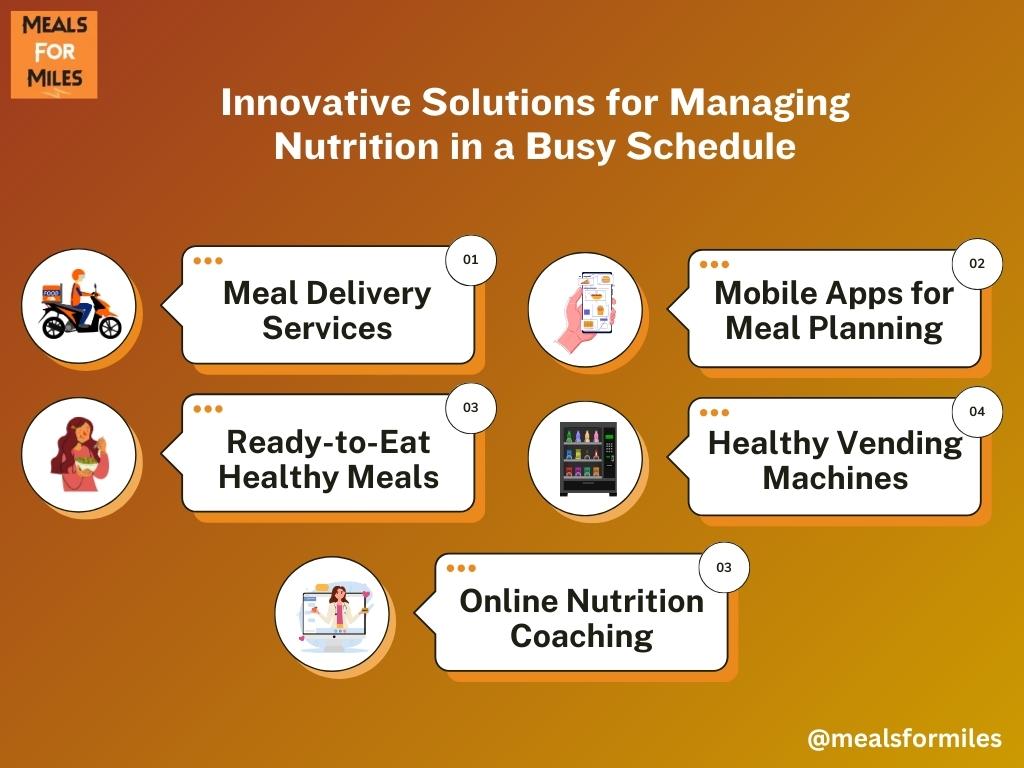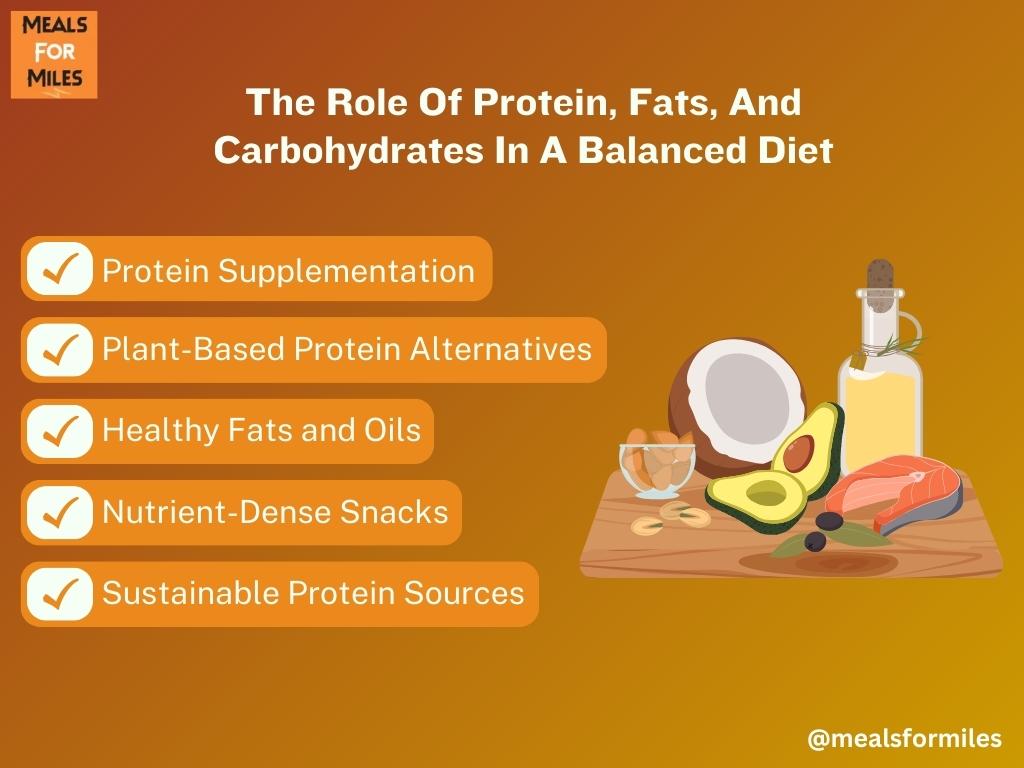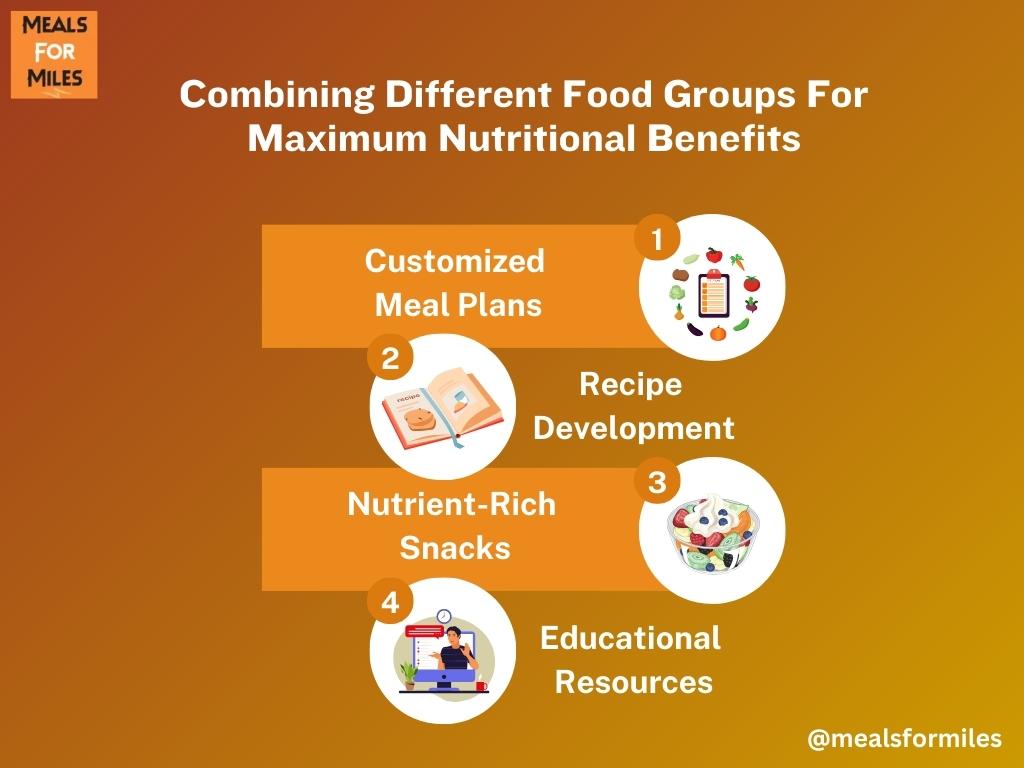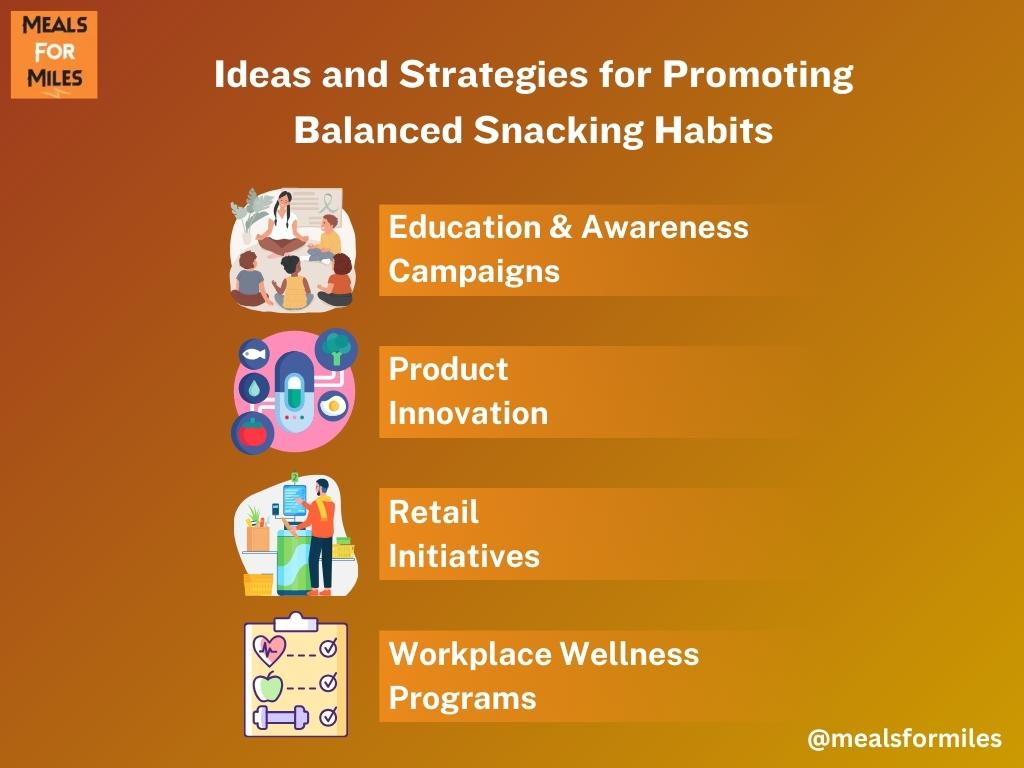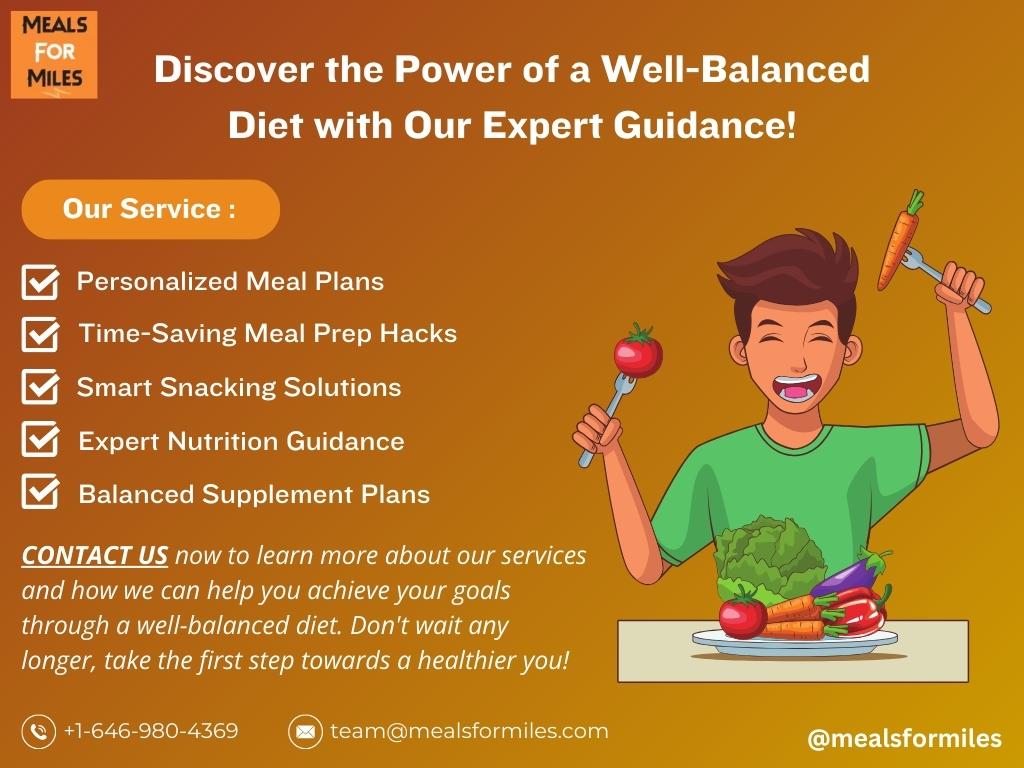Ready to take control of your health and embrace the benefits of a well-balanced diet?
Our team of experts will provide you with personalized meal plans, grocery lists, and recipes that fit your busy lifestyle. Say goodbye to unhealthy habits and hello to a healthier, happier you.
Maintaining a well-balanced diet is crucial for overall health and vitality. It provides essential nutrients, energy, and supports the body’s functions, promoting disease prevention and healthy weight management. Despite busy schedules, strategies like meal planning and healthy snacking can help individuals prioritize nutrition. Adequate intake of macronutrients (protein, fats, and carbohydrates) and micronutrients (vitamins and minerals) is essential for optimal health.
Combining different food groups maximizes nutritional benefits, while meal prepping saves time. Balance in snacking and occasional treats contributes to mindful eating. Supplements may complement dietary needs but should be used judiciously. A well-balanced diet is a cornerstone of a happy and healthy life, requiring dedication and thoughtful choices to nourish the body effectively.
Table of Contents
- Introduction to the Benefits of a Well-Balanced Diet
- How to Manage Eating in a Busy Schedule
- Nutrients Necessary For Optimal Health
- The Role Of Protein, Fats, And Carbohydrates In A Balanced Diet
- Understanding Macronutrients And Micronutrients
- Combining Different Food Groups For Maximum Nutritional Benefits
- Making Time For Healthy Meal Preparation
- Finding Balance With Snacks And Treats
- Supplements: A Necessary Addition To Your Diet
- Final Thoughts On The Importance Of A Well-Balanced Diet
Introduction to the Benefits of a Well-Balanced Diet
Eating a well-balanced diet is essential for optimal health and wellbeing, no matter how busy one’s lifestyle may be. A well-balanced diet provides the body with all the essential nutrients it needs to function properly. It helps to nourish and support our bodies, providing us with energy, vitamins, minerals, and other essential components that help us stay healthy and strong.
Eating a variety of nutrient-dense foods helps to protect our bodies from disease and illness by providing vital vitamins and minerals needed for proper functioning. Additionally, eating a balanced diet can also help promote healthy weight management by providing us with the right amount of calories we need in order to regulate our metabolism. Ultimately, following a balanced diet is an important part of leading an overall healthy lifestyle.
How to Manage Eating in a Busy Schedule
It can be difficult for people with busy lifestyles to find time or energy for proper nutrition; however, there are several strategies that can help make managing meals easier. Meal planning is an excellent way to ensure one has enough time during their day or week for regular meals as well as snacks. Prepping ingredients ahead of time or batch cooking multiple meals at once can also save valuable time throughout the week when trying to juggle different responsibilities while still maintaining good nutrition habits. Additionally, having easy access snacks such as nuts or fruits on hand will prevent one from reaching for unhealthy processed foods out of convenience when they are feeling hungry but short on time resources.
Here are the 10 Innovative Solutions for Managing Nutrition in a Busy Schedule:
- Meal Delivery Services: Collaborate with local meal delivery services to provide healthy and nutritious meals specifically tailored for busy individuals. This saves time on meal planning, ingredient shopping, and cooking while ensuring a balanced diet.
- Mobile Apps for Meal Planning: Develop an app that allows users to plan their meals in advance and generate shopping lists. The app could also provide healthy recipes and nutritional information to help users make informed choices.
- Workplace Wellness Programs: Partner with corporations to implement wellness programs that include nutrition education and meal planning workshops. This would empower employees to make healthier food choices despite their busy schedules.
- Ready-to-Eat Healthy Meals: Create a line of ready-to-eat meals that are conveniently packaged and nutritionally balanced. These meals would be ideal for those who are constantly on the go and need a quick and healthy option.
- Healthy Vending Machines: Place vending machines stocked with nutritious snacks, like granola bars, protein shakes, and fresh fruit, in high-traffic areas such as office buildings and gyms. This allows individuals to grab a healthy snack when they are pressed for time.
- Online Nutrition Coaching: Offer virtual nutrition coaching sessions where certified professionals can provide personalized meal plans, grocery lists, and recipe ideas. This allows busy individuals to receive expert guidance without having to physically attend appointments.
- Workplace Wellness Challenges: Organize challenges within workplaces that encourage employees to prioritize healthy eating habits. This could involve tracking meals, sharing healthy recipes, or even conducting cooking competitions.
- Healthy Meal Kits: Develop meal kits that include pre-portioned ingredients and easy-to-follow recipes, specifically designed for busy individuals. These kits would save time on grocery shopping and meal preparation while still ensuring a balanced and nutritious meal.
- Collaborations with Fitness Centers: Partner with fitness centers to offer nutrition consultations and workshops. This would emphasize the importance of healthy eating in conjunction with regular exercise for maintaining overall wellness.
- Online Meal Planning Communities: Create an online platform where busy individuals can connect, share meal planning tips, and exchange recipes. This virtual community would provide support and inspiration to help individuals stay on track with their nutritional goals despite their busy schedules.
Nutrients Necessary For Optimal Health
In order for our bodies’ systems to work properly, we must provide them with adequate amounts of nutrients found in unprocessed whole foods such as fruits, vegetables, grains, dairy, proteins, legumes, nuts, and seeds. Eating these foods provide us with important vitamins, minerals, antioxidants, fiber, phytochemicals, etc., which all play key roles in ensuring optimal health. Not getting enough nutrients through food increases the risk of developing deficiencies, certain diseases, weakens the immune system, causes fatigue, etc. So it is important to maintain balanced diets filled with real, nutritious food sources in order to ensure proper nutrient intake.
Here are the 10 Strategies and Opportunities to Ensure Nutrients Necessary for Optimal Health:
- Nutrient-Rich Meal Delivery Services: With the growing trend of convenience and health-consciousness, there is an opportunity for meal delivery services that specialize in providing nutrient-rich meals made from whole, unprocessed foods. These services could offer customized meal plans based on individual dietary needs and preferences.
- Nutrient Tracking Apps: As people become more aware of the importance of proper nutrient intake, there is a need for user-friendly apps that track and analyze nutrient intake. These apps could provide personalized recommendations, meal suggestions, and even send reminders to ensure individuals are meeting their daily nutrient requirements.
- Nutrient Education Programs: Many individuals lack knowledge about the importance of different nutrients and how to incorporate them into their diet. Industry experts could develop educational programs, workshops, and online resources to educate the general public about the role of nutrients in optimal health and provide practical tips for incorporating them into everyday meals.
- Nutrient-Fortified Products: Food and beverage manufacturers could develop products that are fortified with essential nutrients to help individuals meet their daily requirements. For example, fortified breakfast cereals, beverages with added vitamins and minerals, or snacks with added fiber and antioxidants.
- Nutrient Testing Services: There could be a rise in demand for services that offer nutrient testing to assess an individual’s nutrient status. These services could provide personalized recommendations based on the test results, helping individuals identify any deficiencies and make necessary dietary adjustments.
- Nutrient-Dense Farming Practices: The agriculture industry could focus on promoting nutrient-dense farming practices to ensure that the produce grown is rich in essential vitamins and minerals. This could involve using organic fertilizers, crop rotation, and selecting nutrient-rich varieties of fruits and vegetables.
- Nutrient Supplementation Guidance: With the increasing popularity of dietary supplements, industry experts could provide guidance on selecting high-quality supplements and offer personalized recommendations based on individual needs. This could help individuals avoid unnecessary supplementation and ensure they are taking the right nutrients in the right amounts.
- Nutrient-Focused Research and Development: There is a need for ongoing research and development in the field of nutrition to better understand the role of different nutrients in optimal health. Industry experts could collaborate with researchers and institutions to conduct studies and develop evidence-based guidelines on nutrient requirements for different populations.
- Nutrient-Focused Culinary Schools: Culinary schools could incorporate a stronger focus on teaching students about the importance of nutrients in cooking. This could include courses on nutrient-rich recipe development, understanding the nutritional properties of different ingredients, and techniques for maximizing nutrient retention during cooking.
- Nutrient-Based Wellness Retreats: Wellness retreats that focus on providing nutrient-dense meals and educating participants about the importance of proper nutrition could gain popularity. These retreats could offer workshops, cooking classes, and activities centered around promoting optimal health through nutrient-rich diets.
The Role Of Protein, Fats, And Carbohydrates In A Balanced Diet
Protein, fats, and carbohydrates are essential macronutrients in a balanced diet. Protein sources include animal and plant-based foods and are important for muscle growth and repair. Fats, from both saturated and unsaturated sources, help with vitamin absorption and energy storage. Carbohydrates, found in complex and simple forms, provide glucose for energy production. It is recommended to consume mostly complex carbs and limit added sugars in order to maintain a healthy diet.
Here are the 10 Innovative Approaches to Enhance the Role of Protein, Fats, and Carbohydrates in a Balanced Diet:
- Protein Supplementation: Explore the development of innovative protein sources, customization options, and new delivery formats to cater to different consumer needs in the protein supplementation industry.
- Plant-Based Protein Alternatives: Introduce new plant-based protein products or improve the taste and texture of existing ones to appeal to a wider consumer base as plant-based diets gain popularity.
- Healthy Fats and Oils: Develop products that offer healthier fat alternatives, such as oils with higher concentrations of beneficial fatty acids, or promote healthier cooking methods to minimize the use of unhealthy fats.
- Low-Carb and Ketogenic Diets: Focus on providing suitable food options for individuals following low-carb and ketogenic diets, including low-carb versions of popular foods and convenient meal options that adhere to specific macronutrient requirements.
- Nutrient-Dense Snacks: Explore the development of convenient and nutritious snacks that are high in protein, healthy fats, and complex carbohydrates to provide a balanced macronutrient profile to support energy levels and satiety.
- Personalized Nutrition: Develop personalized nutrition solutions based on an individual’s unique nutritional needs and goals, leveraging advancements in technology and personalized health tracking.
- Education and Awareness Campaigns: Contribute to educating the public about the role of protein, fats, and carbohydrates in a balanced diet through collaborations with health professionals, nutritionists, and educators.
- Sustainable Protein Sources: Innovate in developing sustainable protein sources, such as alternative proteins like insect-based proteins or plant-based proteins, to reduce reliance on animal agriculture and promote sustainability.
- Functional Foods: Create functional foods that incorporate protein, healthy fats, and carbohydrates with additional bioactive compounds to enhance overall nutritional value, such as fortified foods with added vitamins, minerals, or antioxidants.
- Sports Nutrition: Contribute to the development of specialized sports nutrition products that provide the ideal balance of protein, fats, and carbohydrates for athletes and active individuals, including pre and post-workout supplements, sports drinks, and recovery foods.
Understanding Macronutrients And Micronutrients
Macronutrients, like amino acids, proteins, fats, and carbohydrates mentioned above, and micronutrients, like trace elements, iron, calcium, magnesium, zinc, phosphorus, copper, selenium, iodine, and chromium, are important for the body to function correctly. While macronutrients give caloric value to food, micronutrients are responsible for promoting metabolic processes and disease prevention. Having adequate amounts of both ensures optimal health.
Here are the 10 Strategies to Promote Understanding and Management of Macronutrients and Micronutrients:
- Macronutrient and Micronutrient Testing Services: Suggest the development of specialized testing services that provide individuals with comprehensive reports on their macronutrient and micronutrient levels. These reports could be used by healthcare professionals to create personalized dietary plans and identify any deficiencies.
- Nutritional Supplement Formulations: Given the importance of macronutrients and micronutrients for optimal health, propose the development of advanced nutritional supplements that contain balanced combinations of these essential nutrients. These supplements could be tailored for different age groups, dietary preferences, or specific health conditions.
- Food Fortification Initiatives: In collaboration with food manufacturers, governments, and health organizations, advocate for the fortification of commonly consumed foods with essential macronutrients and micronutrients. For example, cereals and bread could be enriched with iron or folic acid, ensuring that even those with limited access to diverse diets receive necessary nutrients.
- Education and Awareness Campaigns: Implement educational programs and awareness campaigns to educate the general public about the importance of macronutrients and micronutrients. These initiatives could include workshops, seminars, online resources, and partnerships with schools, workplaces, and community centers.
- Development of Functional Foods: Collaborate with food scientists and manufacturers to suggest the development of functional foods that are specifically designed to provide a balanced combination of macronutrients and micronutrients. These foods could be marketed as convenient and healthy options for individuals with busy lifestyles.
- Research and Innovation in Agriculture: Advocate for increased research and innovation in agriculture to develop crop varieties that are naturally richer in essential macronutrients and micronutrients. This could help improve the overall nutritional quality of our food supply.
- Integration of Macronutrient and Micronutrient Tracking in Wearable Devices: Given the popularity of wearable devices such as fitness trackers, suggest the integration of macronutrient and micronutrient tracking features to provide individuals with real-time insights into their nutrient intake. This could help promote healthier eating habits and raise awareness about the importance of a balanced diet.
- Collaboration with Healthcare Professionals: Encourage collaboration between nutritionists, dietitians, doctors, and other healthcare professionals to ensure a holistic approach towards macronutrient and micronutrient management. This could involve creating referral networks, promoting interdisciplinary conferences, and sharing knowledge and best practices among professionals.
- Policy Advocacy: Engage in policy advocacy to encourage governments to prioritize macronutrient and micronutrient education and access to nutritious foods. This could involve lobbying for improved food labeling regulations, tax incentives for healthier food production, and subsidies for nutrient-dense crops.
- Continued Research and Evidence-Based Guidelines: Emphasize the importance of ongoing research to understand the optimal intake levels of macronutrients and micronutrients for different populations. This research could contribute to the development of evidence-based guidelines that healthcare professionals and individuals can rely on for maintaining optimal health.
Combining Different Food Groups For Maximum Nutritional Benefits
To maximize nutritional benefits, it is important to not only focus on individual food groups but also understand how to combine them. For example, combining protein and carbohydrates, such as peanut butter on toast, creates a complete protein with necessary amino acids. Combining fat and carbohydrate, like avocado on toast, creates a nutritionally complete snack.
Stir-frying lean protein and vegetables provides a balance of fats, carbs, and dietary fiber, along with macro and micro nutrients. Additionally, combining various colors of veggies and fruit creates visually pleasing and flavorful meals while adding variety. These combinations help individuals make the most out of their nutritious meals.
Here are the 10 Strategies and Ideas for Maximizing Nutritional Benefits by Combining Different Food Groups:
- Customized Meal Plans: Develop personalized meal plans for individuals with specific dietary needs or goals, incorporating the right combinations of food groups to maximize nutritional benefits, such as meal plans for weight loss, muscle gain, or specific health conditions.
- Recipe Development: Create innovative recipes that combine different food groups in interesting ways, making it easier for individuals to incorporate a variety of nutrients into their diets. This could include recipes for power bowls, smoothies, or one-pot meals that include a mix of protein, carbohydrates, fats, and fiber-rich ingredients.
- Nutrient-Rich Snacks: Develop and market nutrient-rich snacks that combine different food groups. This could include products like protein bars that contain a mix of protein, carbohydrates, and healthy fats, or snack packs that combine fruits, vegetables, and a source of protein like hummus or yogurt.
- Educational Resources: Create educational resources such as articles, videos, or online courses that teach people about the importance of combining different food groups for maximum nutritional benefits. This could include information on the science behind nutrient combinations, meal planning tips, and guidance on portion sizes.
- Collaborations with Food Brands: Partner with food brands to develop products that combine different food groups in convenient and appealing ways. This could include collaborations with meal kit companies to create balanced meal options or working with food manufacturers to develop new products that combine protein, carbohydrates, and healthy fats.
- Menu Consulting for Restaurants: Offer consulting services to restaurants and food establishments to help them create menus that maximize nutritional benefits by incorporating a variety of food groups. This could involve suggesting ingredient combinations, portion sizes, and cooking methods that ensure a balanced and nutritious dining experience.
- Nutrition Workshops and Seminars: Organize workshops and seminars for individuals, schools, or corporate events to educate them about the benefits of combining different food groups for optimal nutrition. These sessions could include cooking demonstrations, interactive activities, and hands-on learning experiences.
- Online Platforms and Apps: Develop an online platform or mobile app that provides users with personalized meal recommendations, recipes, and shopping lists based on their individual nutritional needs and preferences. This could include features that track nutrient intake, suggest meal combinations, and provide nutritional guidance.
- Cookbook Publication: Write and publish a cookbook that focuses on combining different food groups for maximum nutritional benefits. This could include a collection of recipes that showcase the synergy between various food groups, along with detailed nutritional information and tips for readers.
- Partnerships with Healthcare Professionals: Collaborate with registered dietitians, nutritionists, or healthcare professionals to promote the importance of combining different food groups for optimal nutrition. This could involve joint seminars, webinars, or content creation that educates individuals on the benefits of these combinations and how to incorporate them into their daily lives.
Making Time For Healthy Meal Preparation
Finding enough time to prepare healthy meals can be a challenge for those leading busy lifestyles. However, planning and making a few small changes can allow for extra space for meal prepping. Shifting bedtime and waking up earlier, for example, allows for additional minutes in the morning to dedicate to preparing breakfast, lunch, dinner, and snacks.
Also, batch cooking big batches of cooked grains, roasted veggies, or soup ahead of time saves valuable preparation time throughout the week. Additionally, delegating tasks to family members or splitting dinner duties, for instance, is helpful and frees up someone’s schedule. Lastly, taking advantage of leftovers and repurposing them into new recipes is a great way to maximize efforts already spent cooking a particular dish.
Here are the 10 Innovative Solutions for Time-Efficient Healthy Meal Preparation:
- Introduce Meal Prep Delivery Services: Suggest partnering with local meal prep services or starting your own delivery service to provide healthy, pre-prepared meals to busy individuals, saving them time and effort in meal preparation.
- Develop Time-Saving Kitchen Gadgets: Identify and promote innovative kitchen gadgets that streamline meal preparation, such as multi-functional cookers or vegetable choppers that can quickly cut and dice vegetables.
- Offer Meal Planning and Recipe Services: Provide a platform or app where customers can access customized meal plans and recipes based on their dietary preferences and time constraints, helping them save time on meal planning and grocery shopping.
- Collaborate with Fitness Centers: Partner with gyms or fitness centers to offer on-site meal prep workshops or cooking classes, educating busy individuals on efficient meal preparation.
- Create Pre-Packaged Healthy Meal Kits: Develop pre-packaged meal kits with portioned ingredients and step-by-step instructions for quick and easy meal preparation, catering to different dietary needs and preferences.
- Establish Corporate Wellness Programs: Work with companies to implement wellness programs that prioritize healthy eating habits, such as providing on-site healthy meal options or organizing lunchtime cooking demonstrations for employees.
- Collaborate with Technology Companies: Partner with technology companies to create smart kitchen appliances that optimize meal prep time, such as refrigerators that track inventory and suggest recipes or digital assistants that provide cooking instructions.
- Develop a Line of Pre-Made Healthy Snacks: Offer a range of pre-made healthy snacks, including protein bars, fruit and nut packs, or pre-portioned snack bags, providing convenient and nutritious options for busy individuals.
- Provide Educational Resources: Create online courses, e-books, or video tutorials that educate individuals on efficient meal preparation strategies, including time management, organization, and quick and healthy recipe ideas.
- Invest in Research and Development: Focus on researching and developing new techniques or products that further optimize meal preparation time, such as exploring new cooking methods, innovative food packaging, or extending the shelf life of pre-prepared meals without compromising quality.
Overall, the key is to continually innovate and provide solutions that cater to the time constraints of busy individuals, while still prioritizing their health and well-being.
Finding Balance With Snacks And Treats
Snacking often gets a bad rap for being unhealthy, but the truth is that snacking between meals is a great way to keep blood sugar levels stable and maintain a steady source of energy throughout the day. Making the right snacking choices, focusing on natural, whole-grain options like fruits, nuts, seeds, yogurt, granola bars, smoothies, trail mixes, and dried fruits, is important.
Instead of reaching for processed sugary snacks, try healthier alternatives to satisfy cravings. Providing yourself with the opportunity to indulge in treats in moderation creates balance within your eating habits, and doing so will lead to a healthier, more mindful relationship with food overall.
Here are the 7 Ideas and Strategies for Promoting Balanced Snacking Habits:
- Education and Awareness Campaigns: Collaborate with nutritionists and health professionals to create educational campaigns that highlight the benefits of healthy snacking and provide tips on making smarter snack choices. This could include social media campaigns, informative blog posts, and partnerships with influencers to reach a wider audience.
- Product Innovation: Encourage food companies to develop and market healthier snack options that are convenient, tasty, and made from natural ingredients. This could involve creating low-sugar granola bars, baked fruit chips, or vegetable-based snacks that mimic the taste and texture of traditional treats.
- Retail Initiatives: Work with grocery stores and supermarkets to create dedicated sections or aisles for healthy snacks and treats. This would make it easier for consumers to find and choose nutritious options, while also providing an opportunity for smaller, local brands to showcase their products.
- Workplace Wellness Programs: Collaborate with companies to implement workplace wellness programs that promote healthy snacking habits. This could involve providing employees with access to fresh fruits, nuts, and yogurt in office kitchens or organizing educational workshops on healthy snacking.
- Collaboration with Schools: Partner with schools to incorporate nutrition education into the curriculum and promote healthy snacking options in the cafeteria. This could include providing recipe ideas for homemade snacks or working with food service providers to offer healthier alternatives to traditional vending machine snacks.
- Community Events and Partnerships: Organize community events, such as health fairs or cooking demonstrations, to promote the concept of balanced snacking. Partner with local gyms, wellness centers, and health organizations to raise awareness about the importance of mindful eating and provide resources for individuals looking to make healthier snack choices.
- Personalized Snack Subscription Services: Develop personalized snack subscription services that cater to individual dietary preferences and health goals. These services could offer curated boxes of nutritious snacks based on the customer’s profile, making it easier for individuals to discover and enjoy healthier options.
By implementing these ideas, we can shift the perception of snacking from being unhealthy to being a vital part of a balanced and mindful approach to eating. This will not only benefit individuals by providing them with sustained energy and improved overall health, but also create opportunities for businesses to thrive in the growing market for healthy snacks and treats.
Supplements: A Necessary Addition To Your Diet
Adding supplements to one’s diet can be beneficial at times and in certain cases to assist in achieving daily recommended intakes of certain vitamins and minerals. Essential fatty acids like omega-3, -6, and -9, probiotics, B12, multivitamins, multiminerals, collagen, vitamin C, omega-3s, magnesium, zinc, and adaptogenic herbs like ashwagandha, rhodiola, ginseng, turmeric, and curcumin are great additions too. However, supplements should always be taken with discretion and a comprehensive understanding of one’s own dietary needs. Speaking with a doctor or healthcare professional is the best way to determine what type of supplementation is appropriate for a person’s situation.
Here are the 11 Strategies for Responsible and Informed Use of Dietary Supplements:
- Personalized Supplement Plans: Suggest personalized supplement plans based on an individual’s specific dietary needs, lifestyle, and health goals, which may involve conducting comprehensive assessments and consultations.
- Combination Supplements: Develop combination supplements that include a variety of essential vitamins, minerals, and beneficial compounds, formulated to target specific health conditions or support overall wellness.
- Sustainable Sourcing and Production: Emphasize the importance of sustainable sourcing and production methods for supplements, including partnering with eco-friendly suppliers, using organic ingredients, and implementing responsible manufacturing practices.
- Education and Awareness Campaigns: Create informative content, organize workshops, or collaborate with healthcare professionals to raise awareness about the role of supplements in maintaining optimal health.
- Quality Assurance and Testing: Develop rigorous quality assurance protocols to ensure the safety and efficacy of supplements, including regular testing for purity, potency, and contaminants.
- Customized Formulations for Specific Demographics: Consider developing specialized supplement formulations for different age groups or specific demographics, addressing unique nutrient requirements and supporting specific health needs.
- Integration of Technology: Explore the use of technology to enhance the supplement experience, such as developing mobile apps or online platforms for tracking supplement intake and accessing personalized recommendations.
- Collaboration with Healthcare Professionals: Strengthen partnerships with healthcare professionals to align supplement recommendations with an individual’s overall healthcare plan, through joint workshops, referral programs, or shared educational resources.
- Transparency and Labeling: Advocate for clear and transparent labeling on supplement products, providing accurate information about ingredients, dosage, and potential side effects to help consumers make informed decisions.
- Research and Development: Invest in research and development to explore new ingredients, formulations, and delivery methods for supplements, including conducting clinical trials and exploring innovative delivery systems.
- Consumer Support and Education: Establish customer support channels and educational resources to assist consumers in making informed decisions about supplement usage, including dedicated helplines, online chat support, and informative materials.
Final Thoughts On The Importance Of A Well-Balanced Diet
Eating a well-balanced diet is a critical component of living a happy, healthy life. It requires dedication and forethought to understand and meet the body’s nutritional needs. Taking steps to plan, organize, grocery shop, cook, prepare, and eat mindfully and thoughtfully goes a long way towards establishing a sustainable foundation of good nutrition.
The importance of a well-balanced diet cannot be overstated. Making smart decisions when it comes to eating, and choosing the right types, quality, and quantity of food, matter when it comes to fueling our physical, mental, and emotional wellbeing. Following the tips discussed in this article can help take steps towards achieving an optimized and nourished self.
Call us now to learn more about our services and how we can help you achieve your goals through a well-balanced diet.
Don’t wait any longer, take the first step towards a healthier you!


